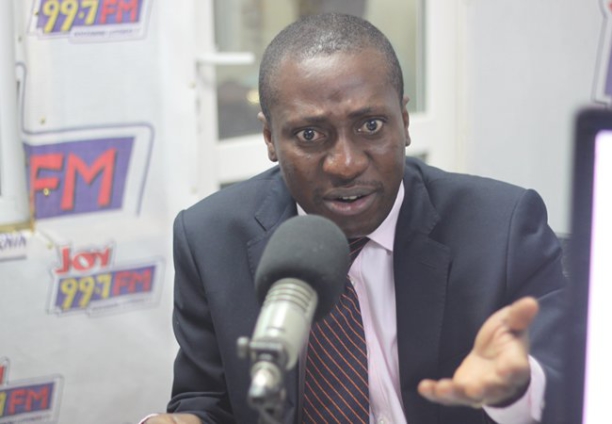The Deputy Majority Leader in Parliament, Alexander Afenyo-Markin, has called on his colleagues in the Minority, to graciously accept the decision of the Supreme Court, delivered on Wednesday, March 9, 2022.
Addressing the press on Thursday, the Effutu MP stated that, he is appalled by the reaction of members of the Minority, after the apex court ruled that, a Deputy Speaker can vote and be part of quorum, while presiding as the Speaker of the House.
According to him, the posture of the NDC lawmakers, undermine the integrity of the Judiciary; a situation which can affect the country's democracy.
He therefore called on the NDC to embrace the verdict of the Court, despite their reservations.
"It is incumbent upon us to respect the decisions of our Court. If we're not ready to respect their decision, then we shouldn't run to them. But once you run to them and they deliver their decision, we should take it as a bitter pill or a sweet chocolate. If it's bitter, take it. Tomorrow, that decision could be an authority for your own cause.
How on earth will the Minority Leader make a statement to the effect that the Supreme Court wants to support the passage of the E-levy? Wasn't it their party member who went to Court? Or to them, immediately they go to Court, they must win at all cost", he quizzed.
Afenyo-Markin also added, "We're drawing their attention to the fact that if they continue to breakdown the institutions of democracy, one day, they'll come back to cross the bridge, and there'll be no bridge to cross back home.
The NDC is destroying everything that sustains good governance. And that is not how to operate a democracy. Extremist attacks cannot be the way to go. Argue forcefully. When you lose graciously, accept it".
Mr. Afenyo-Markin also noted that the NDC does not appreciate principles in their dealings, the party rather looks out for what is convenient for them, always.
In his view, the decision of the Supreme Court supersedes all other opinions, and therefore it must be accepted by all.
Background
On Wednesday, March 9, the Supreme Court ruled that a Deputy Speaker of Parliament can be counted during the formation of a quorum for parliamentary decision-making and participate in voting while presiding over proceedings of the House.
The Court presided over by Justice Jones Dotse, therefore, affirmed the approval of the 2022 Budget without NDC MPs’ participation.
Private Legal Practitioner Justice Abdulai filed the case against the Attorney-General.
He had asked the Supreme Court to interpret Articles 102 and 104 of the 1992 Constitution and declare the action of Mr. Osei-Owusu as unconstitutional.
He also wanted the Supreme Court to declare the whole proceedings in Parliament on November 30, 2021, which led to the passage of the 2022 Budget as unconstitutional, insisting the Deputy Speaker should not have counted himself as an MP when he presided over proceedings.
However, on behalf of the state, the Attorney-General (A-G), Godfred Yeboah Dame, argued that no express provision in the 1992 Constitution stops a Deputy Speaker presiding over proceedings from voting or counting himself as part of MPs present, to form the right quorum.
He argued that the quorum in Parliament formed under Article 102 is different from the quorum formed under Article 104 of the 1992 Constitution.
He stated that the quorum under Article 102 is for the conduct of business in Parliament, and that is why Article 102 provides that it should be one-third of members.
“Given that Parliament presently is made up of 275 members, the quorum under Article 102 for the conduct of its business is 92 MPs,” the A-G submitted.
According to the A-G, based on the clear provision of Article 102, any person presiding, either the Speaker or Deputy Speakers, is precluded from being part of that quorum.
On the other hand, the A-G believed that the quorum under Article 104 (1), which deals with the determination of matters through voting in Parliament, requires at least half of all MPs, and such a quorum is not the same as the one in Article 102.
Mr. Dame contended that unlike Article 102, which precludes a “person presiding” from being part of the quorum, Article 104 (2) precludes explicitly “The Speaker”.
The A-G, therefore, held the position that only the person elected as “The Speaker” of Parliament is barred from forming part of the quorum under Article 104 when presiding, and not the Deputy Speakers who preside over proceedings in the Speaker's absence.
Latest Stories
-
Paris 2024: Opening ceremony showcases grandiose celebration of French culture and diversity
3 hours -
How decline of Indian vultures led to 500,000 human deaths
4 hours -
Paris 2024: Ghana rocks ‘fabulous fugu’ at olympics opening ceremony
4 hours -
Trust Hospital faces financial strain with rising debt levels – Auditor-General’s report
5 hours -
Electrochem lease: Allocate portions of land to Songor people – Resident demand
5 hours -
82 widows receive financial aid from Chayil Foundation
5 hours -
The silent struggles: Female journalists grapple with Ghana’s high cost of living
5 hours -
BoG yet to make any payment to Service Ghana Auto Group
5 hours -
‘Crushed Young’: The Multimedia Group, JL Properties surprise accident victim’s family with fully-furnished apartment
6 hours -
Asante Kotoko needs structure that would outlive any administration – Opoku Nti
6 hours -
JoyNews exposé on Customs officials demanding bribes airs on July 29
7 hours -
JoyNews Impact Maker Awardee ships first consignment of honey from Kwahu Afram Plains
8 hours -
Joint committee under fire over report on salt mining lease granted Electrochem
8 hours -
Life Lounge with Edem Knight-Tay: Don’t be beaten the third time
8 hours -
Pro-NPP group launched to help ‘Break the 8’
8 hours

